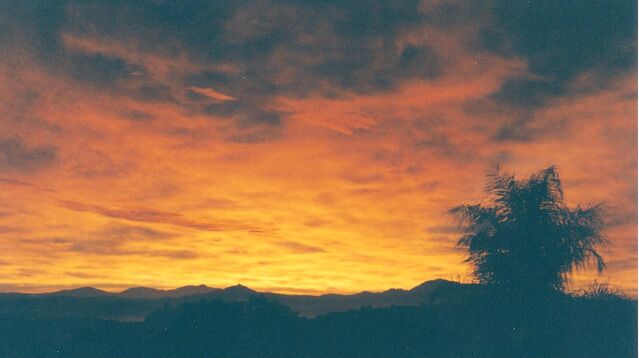Fantasies
What If an Apocalypse Is Now the New Normal?
What can we learn from those who survived past apocalyptic events?
Posted September 2, 2021 Reviewed by Jessica Schrader
Apocalyptic fiction is based on the reader’s fear of a cataclysmic event that will plunge the Earth into some powerful, destructive “end times.” But what does the writer of apocalyptic fiction do when the apocalyptic future is here and now, and it is not just one cataclysmic event—it is many?
In 2011, I wrote a screenplay based on a series of brutal attacks on the homeless in Southern California. Later, I turned that screenplay into a novel titled The Accountant’s Apprentice. From the time I started the novel until it was published in 2018, the homeless population in those same areas had grown into tent cities, with thousands of people joining the homeless every day. Those tent cities looked to me like precursors to some apocalyptic threat of biblical proportions converging on the present moment in human history.
I am currently working on a sequel to that novel, but I am confronted by one major obstacle: whatever fictional threats I conceive, I can’t stay ahead of the real-life threats that seem to be pummeling the planet everywhere. Just this morning, Hurricane Ida pulverized Louisiana and other Southern states, leaving the residents without adequate shelter, food, and drinking water. Even as I write this, the same hurricane has drifted into the Northeastern states in the form of epic torrential rainstorms that are creating massive, unprecedented flooding in New York and elsewhere.
Meanwhile, out-of-control wildfires in Northern California are converging on scenic Lake Tahoe, threatening massive losses of homes and other structures.
Not to be outdone, the COVID-19 pandemic is surging wildly across the world, appearing on our television screens in reddish-purple maps, as though drenched with the blood of the growing fatalities.
Not enough disasters? Well, OK, then there are new, seemingly exotic insects deforesting the wilderness areas that create the oxygen we all breathe. I haven’t even mentioned rising carbon dioxide levels in the atmosphere and, of course, massive political corruption that engages in “mask wars” while simultaneously failing to address any of the real problems that threaten our country and humanity as a whole.
In short, no writer of apocalyptic fiction could ever create a plot more terrifying than the one we are actually living in. So what are we to do to find a pathway out of this apocalyptic present moment?
I decided to go back and reread The Diary of Samuel Pepys, which recorded the author’s experiences during the bubonic plague in London from 1660-1690. I didn’t get too far into Pepys’ diary when I gave up. I admired Pepys courage in trying to maintain some semblance of normality in a city stacked high with dead bodies, but he was writing about one threat to humanity—the bubonic plague. I was one of the many who were living through several apocalyptic events that were converging simultaneously all across the world.
I had studied the life and poetry of Emily Dickinson, the great 19th-century New England poet, and I knew she wrote many of her poems during and after watching several of her friends and loved ones die from the scourge of tuberculosis. Those losses drove her indoors and contributed greatly to her decision to become a recluse who appeared elusively at her upstairs bedroom window in a white habit, and then quickly vanished back into the depths of her Amherst, Massachusetts, home.
Edgar Allen Poe, another 19th-century poet, also suffered greatly from the ravages of tuberculosis. Those losses included three of the most cherished women in his life: his mother, stepmother, and beloved wife Virginia. Surrounded by all the death and destruction unleashed by tuberculosis, Poe did not fare well. He turned to alcohol, opium, and long night vigils while he slept by the grave of his dead wife.
Dickinson and Poe did not offer a great deal of hope for how to survive the tuberculosis pandemics that ravaged their own time and place in history. Perhaps a case could be made that tragedy creates great literature. However, I wanted more. I wanted some lessons for how to survive and thrive in the midst of personal losses and worldwide carnage.
Thornton Wilder, a more recent author, offered some hope, although his works are often considered a notch or two below other writers in our literary canon. He is most famous for his play Our Town, which encourages us to think more in terms of the “we” than the “I” as we move through life. The title itself suggests that the planet Earth is “Our Town,” not “My Town.”
This sense of shared sacrifices and mutual obligations to one another is even more prominent in his other play, The Skin of Our Teeth, which was first performed in 1942 as the country was emerging from the Great Depression and entering World War II. The action in this play is spread across the entire history of the human race. The members of the Antrobus family witness virtually every calamity humanity has ever encountered—and yet they have survived.
As the time-liberated family survives the Ice Age, world wars, and economic depressions, the play emphasizes that we have always escaped by “The Skin of Our Teeth.” In other words, there is no “normal.” This tiny speck of dust floating around in a vast universe has always been under attack from hostile forces. And yet we have somehow managed to survive. Like Our Town, the play enforces the idea that we did this through mutual cooperation and shared sacrifice, not through selfish “me-centered” attitudes toward our fellow inhabitants of this small piece of soil and water drifting across space and time.
Did I convince myself that once we have survived the recent threats to our planet, there will be a more “normal” future? Like Wilder, I’m not too sure there is a “normal” anywhere in our history. However, he clings to an optimistic view that humanity can eventually overcome any challenge to its very existence. I yield to his optimism and hope that he is right.





